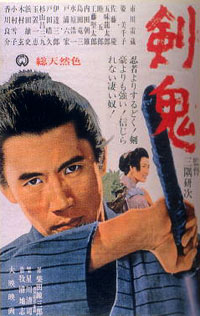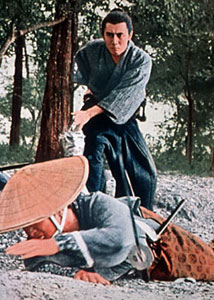 Based on a gloomy story by Renzaburo Shibata, Sword Devil; aka, The Curse (Kenki, 1965) stars Raizo Ichikawa, probably best remembered for his Kyoshiro Nemuri full moon swordsman "sleepy eyes of death" films, Kyoshiro having also been the creation of Renzaburo Shibata.
Based on a gloomy story by Renzaburo Shibata, Sword Devil; aka, The Curse (Kenki, 1965) stars Raizo Ichikawa, probably best remembered for his Kyoshiro Nemuri full moon swordsman "sleepy eyes of death" films, Kyoshiro having also been the creation of Renzaburo Shibata.
One of the finest chambara directors, Kenji Misumi, responsible for episodes of films about both Zatoichi & Kyoshiro Nemurai, helmed the project. The appealing score was by Hajima Kaburagi.
Okin (Yukiko Kobayashi), a lady-in-waiting of the "inner palace," or women's quarters, is faithful to her mistress even after Lady Makino has gone crazy. She is the only witness to her mistress's death. In the last moments of life, she tells her made to take care of her beloved dog, & to "Consider this dog to be myself."
The servant in consequence heaped attentions on the dog, but it nevertheless died ten days after Lady Makino, of grief. And when several months later the lady-in-waiting died in childbirth, no one would admit any man could've had access to the women's palace. It was half-jestingly rumored Okin slept with Lady Makino's dog.
The orphaned newborn is named Hempei, meaning "spotted," as the infamous dog had been spotted; & "Pei" meant lower rank, which the dog had held as Lady Makino's companion. The infant is raised by a low-ranking samurai as his son.
Twenty-three year old Hanpei, played with soft sensitivity by Raizo Ichikawa, is still stigmatized as "the dog's child." He was barely treated as human except by his foster-father, a very low ranking samurai, who is now ill, & worried how his foster-son will be able to thrive without anyone to protect him.
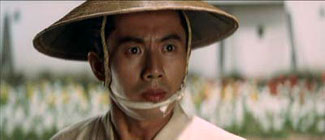 From his death bed, the old retainer counselled Hempei to "Become the best in one art," so that people cannot persecute him. With any unexcelled skill, he can become successful in the world. From his death bed, the old retainer counselled Hempei to "Become the best in one art," so that people cannot persecute him. With any unexcelled skill, he can become successful in the world.
As he loves flowers & has superb luck raising them, he focuses on this as his special ability. His horticultural skills get him a job as Castle gardener, & a commission to design an entirely new garden.
He enjoys this occupation, despite that people speak behind his back, & say his skill as a gardener is due to his dog's nose, which can smell which soil is best. He gains some respect for his talents even so.
This is the castle where Hanpei's mother had been lady-in-waiting to the deranged mother of the current provincial lord. A somewhat pitiful fellow, the Young Lord is prone to crazed, violent lapses, beating grooms with whips & threatening pages with swords for no reason.
The lord's loony behavior is shown in several colorful or odd vignettes. The clan elder, Kambe (Kei Sato), well knows that if the Tokugawa government learns of the young daimyo's insanity, the clan will be abolished, as the crazy lord has no heir. It is no easy task to hide the castle lord's madness from shogunate spies.
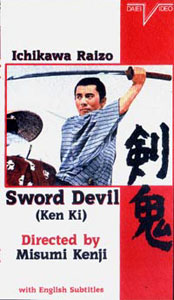 Hanpei the gardener has another ability widely credited to his animal lineate. He can run with preternatural swiftness & can even outrun a horse. He is assigned to run & stop the Lord's horse whenever he goes on one of his uncontrollably enraged rides.
Hanpei the gardener has another ability widely credited to his animal lineate. He can run with preternatural swiftness & can even outrun a horse. He is assigned to run & stop the Lord's horse whenever he goes on one of his uncontrollably enraged rides.
The Lord knows Hanpei was the son of his late mother's final attendant, & is impressed to see him run so fast. So he makes him his horse's groom.
One day in the forest gathering rich humus for his gardens, Hanpei sees a mature ronin, Saeno Yaichiro (Asao Uchida), practicing an amazing sword technique, & is suddenly desirious of receiving instruction.
For his first lesson he is told only that kenjutsu is full of illusory methods, but pure iai (quick-draw) has one truth: draw, cut, re-sheathe. Nothing more. It cannot be taught but must be seen & comprehended.
Yaichiro comes off almost like a forest spirit rather than a mortal samurai, heightening the fairy-tale tone of the story, even though the supernatural remains always just beyond the edges of this realistic tale.
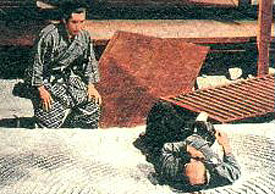 Hanpei begins observing & emulating lightning-fast draws & cuts. With his unusual strength, natural speed, & heightened senses, Hanpei soon masters iai, though never having set foot in a dojo (sword academy). Hanpei begins observing & emulating lightning-fast draws & cuts. With his unusual strength, natural speed, & heightened senses, Hanpei soon masters iai, though never having set foot in a dojo (sword academy).
The ronin gives the untitled florist his first sword, saying, "I really did want to pass on my skill before I die. To give my sword to you is an honorable event in my life."
There comes a day when Hanpei combines his running & iai skills to assassinate a shogunate spy. Thereafter Kanbei (Kai Sato) takes Hanpei under his wing & uses him as a ninja-killer, whenever such spies are detected. He tragically kills his own sensei, Yaichiro, but the ronin dies feeling lucky to have been killed by his own heir, with a magnificent talent from heaven.
But as for Hanpei, he is griefstricken & breaks his sword. His dream has been to turn the hillside & meadows into a richly flowered landscape, & he does not like that he became an assassin.
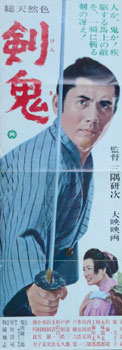 Osaki (Michiko Sugata), Hanpei's girlfriend, is a vegetable vendor of considerable beauty. When a crude samurai decides to rape her, Hanpei rushes to her rescue.
Osaki (Michiko Sugata), Hanpei's girlfriend, is a vegetable vendor of considerable beauty. When a crude samurai decides to rape her, Hanpei rushes to her rescue.
At a shrine for cast-off swords alleged to have become infused with darkness, Hanpei discovers one great blade, & takes it as his own. These swords belonged to suicides or madmen & are all ill-omened. He admits he knows little of how to judge a sword's intrinsic merits, but, "I was attracted to the evil spirit of this one."
It had once been Oda Rozaemon's sword, a famous bandit. His sword is named Azamaro & no one can guess how many men & women it killed. It was handed down from days of the Heike clan & had been used for ruthless purposes by Taira-no-Kagekiyo, who then starved himself to death in prison.
"An evil sword brings bad luck," Hanpei admits. But he has had bad luck already as "the dog's child," so believes such a sword cannot give him worse.
Meanwhile a secret rebellion is fomenting within the clan, to replace the increasingly mad daimyo with an adopted son. It becomes Hanpei's sorry task to stop them.
When the clan's situation suddenly changes, many want revenge against Hanpei for having killed clan members. But as he only acted with proper orders, the many requests for permission to pursue vengeance are denied.
Men nevertheless arrange to ambush Hanpei in the dell which he & Osaki have turned into a flowered wonderland. Carnage ensues amidst the flowers, Hanpei reeving until he can no longer stand, fighting on & on even while laying on his back.
Sword Devil is a minor but wholeheartedly serious swordplay feature. It has some corny moments, but many more of consdierable beauty. Like a good Magic Realist short story, it seems always on the verge of spilling into fantasy without doing so. With the extraordinary actor Raizo Ichikawa at center stage, it's most definitely a must-see for fans of samurai cinema.
SECOND REVIEW:
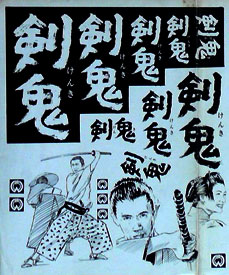 [I reviewed this film for a fan publication in the 1970s, after seeing a 35 mm subtitled print at the Kokusai Cinema in Seattle, under the title The Curse. Though somewhat redundant to the dvd review, my sentiments & understanding of the film thirty years ago was different enough to append my previous take on the film.] [I reviewed this film for a fan publication in the 1970s, after seeing a 35 mm subtitled print at the Kokusai Cinema in Seattle, under the title The Curse. Though somewhat redundant to the dvd review, my sentiments & understanding of the film thirty years ago was different enough to append my previous take on the film.]
In The Curse directed by Kenji Misumi, a lady-in-waiting, faithful to her mistress even when her lady has gone crazy, is the only witness to the woman's death. In the last moments of life, she tells her lady-in-waiting, "Consider this dog to be myself.
Months later the lady-in-waiting dies in childbirth, with the rumor that the dog was the baby's father. Named Hanpei, or "Spotted," the infant is raised by a low-ranking samurai as his son. Twenty-three years later, on his death bed, the foster-father tells Hanpei the Dog Boym, "Become the best in one art," so that people will not persecute him so much.
Hanpei becomes a successful flower grower &, though people say it's because his dog's nose can smell which soil is best, he gains respect for his talents, & a commision to keep gardens in the castle.
At the castle, the son of the mistress of Hanpei's late motehr has become the provincial lord. A pitiful fellow, he is prone to violent, crazed outbreaks, beating grooms with whips & threatening pages with swords for no reason. Kambei (Kei Sato) heads up an effort to hide the young lord's insanity from shogunate spies, who would use any excuse to abolish the clan.
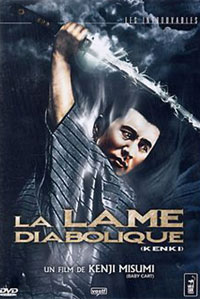 Hanpei has other talents besides gardening. He can run as fast as a horse, an ability which amuses the half-crazy lord. Also about this time, Hanpei meets an intinerant swordsman who is master of the nodachi, an extremely long sword. This, in addition to flower growing, will become Hanpei's perfect art. Hanpei has other talents besides gardening. He can run as fast as a horse, an ability which amuses the half-crazy lord. Also about this time, Hanpei meets an intinerant swordsman who is master of the nodachi, an extremely long sword. This, in addition to flower growing, will become Hanpei's perfect art.
The itinerant swordsman turns out to be a shogunate spy, who later dies at Hanpei's hands. Kambe uses Hanpei shamelessly to hunt down & kill spies & clan rebels, until the crazed lord eventually falls into a well & drowns himself, so that all the machinations & murders were for nothing.
In the end, Hanpei is attacked in his secret flower garden in a one-against-all duel which he wins, but with no chance of ever finding happiness.
This story is aimed to some degree at a juvenile audience & as a result has some silly moments, especially in the speeded up shots of Hanpei's running skills. It's an entirely enjoyable film, however, a tale delivered with solemnity & conviction.
Most of the characters are sympathetic, even those presumed to be the enemy, so that we are witnessing a situation for which all sides mean to do good, but cannot always do so. This is a pleasing change from the usual good-guy versus bad-guys in so many low-budget samurai films.
The film's success hinges on Raizo Ichikawa's delivery of the character of Hanpei, the sweet young man shunned as half-human, patient with people who tease him, obsessed with the beauty of flowers. When the itinerant Yaichiro Saeno teachs this sweet fellow the use of nodaichi, there is a definite poignancy to the flower-lover becoming a spy-killer.
The young woman (Michiko Sugata) who loves Hanpei cannot believe he has become a killer, & failing her expectation, the young man comes to doubt his own worth.
The fantasy elements of the film are never completely in the foreground. We never know if he is really half-dog or not; &, if not, how else has he gained his extreme fleetness.
When he is most discouraged with himself, another faint fantasy element is interjected, as he visits Ghost Shrine, where ill-omened swords are retired. There he selects a sword with "eerie fearsomeness" named Aza-Maru, once once belonged to an infamous bandit &, before that, belonged to a survivor at Dan-no-ura where the Heike clan was destroyed many centuries before.
The horror elements of this portion of The Curse are never fully developed, but weirdness is skirted. In the climactic scene when Aza-Maru has its tip broken off, but Hanpei continues to use it effectively, there is even the weird suggestion that he will continue to be a successful swordsman throughout life, always using the extra-long sword broken off to normal length.
So though partially a youth film or family film, there is even so a grimness which makes it serious & effective. It's a surprising example of what can be regarded suitable family viewing in Japan, void of the lightness of family films in the west.
copyright © by Paghat the Ratgirl
|
